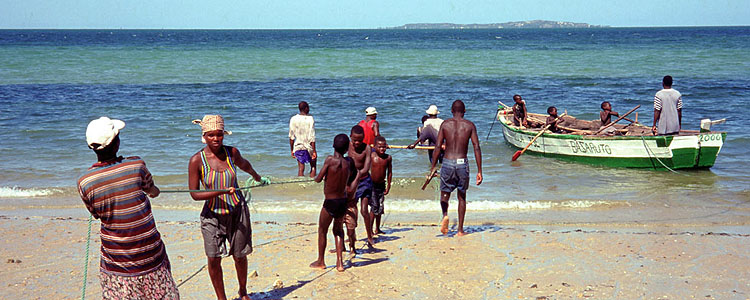March 16, 2002
 Mozambique
Mozambique
In the morning, many families unfolded a net that was so long as a soccer ground. After it was completely opened, when the tide began to rise, men went into the sea making a semicircle that could catch any fish, mollusk or crustacean that was in it. Men, children and even old women changed positions for hours with only one wish: that the sea was generous.
Km 15,817
Mozambique is a poor country, one of the poorest ten countries in Africa, I was told. After many days in Maputo, I have overcame the Argentine 2001 econimics and financial crisis. So with the support of local sponsors, I set out to the route again.
I remembered the beginning of my biking, under that burning sun, along the routes, so different from South Africa. A thick and at the same time dry vegetation, a sandy ground and many people walking from a place to another with huge pails on their heads, carrying the water to drink during the day.

Corn and sugar cane fields, plane and mango trees gave me an idea of their diet.
About noon I reached a small town, where I was lucky and sheltered from the sun and asked some food, too. At night I understood that that good lunch was to compensate the cup of milk and the bread I took for dinner when I reached to Palmeiras. So since that day, I realized I had to carry some food and cook with my stove.
Mozambiquean South Coast
Although Mozambique is a country which tourist industry is at the peak of its development, a visit to some places with little structure is worth.
The characteristic of all its people is their everyday by the sea. With dawn you can see dozens of little ships going out for food. They are the men of all ages that set out to the horizon where you can hardly see them after some hours. It seems that the sea doesn’t give them rest when you look at the traces of the years in their faces and hands.

With my bike I visited Tofo and Vilanculos, two towns of fishermen that I’ll never forget. I spent more than a week in Tofo. I stayed in a camp site far away from town. At noon, walking along those huge beaches when the sea let me do it, I came across those men who, after their working day, went to their houses that were hidden among palm trees and dunes. They carried about ten fishes each they hoped to sell to anybody they met in their way home.
During the last days there, and after realizing that I was in one of the best places for diving in Africa, many travelers from different points around the world whom I talked with in Tofo encouraged me to start to learn about the world of diving. I got a discount price in Tofo Diving and did the course. Diving five times was enough to awake a new passion in me. I was satisfied by all kind of coral beads, starfishes, shells, many different shoals of fishes full of colors and even a shark.
In Vilanculos, with the lowest tide, the different islands and the coral reefs turned the beach into a real paradise. It seemed that you never reached the sea to swim, unless you walked for a very long time.
In the morning, many families unfolded a net that was so long as a soccer ground. After it was completely opened, when the tide began to rise, men went into the sea making a semicircle that could catch any fish, mollusk or crustacean that was in it. Then, all the family began to work, dragging the net to the beach. They used large sticks that they hooked to the ropes of the net. Men, children and even old women changed positions for hours with only one wish: that the sea was generous..

In the last days there I was invited to one of their sail boats to share a part of their working day. Renato and Jose commanded the ship while we were going to Bazaruto and Benguera islands.
It was funny to see how they winded up the string in their toe waiting for the pull that announced their food; in the meanwhile I waited with my hands opened some “sierra” fish (a big one!) bited. Those six hours we shared on board convinced me that, in those waters, hands were overcome by the local ability that toes have
USEFUL DATA
WHEN TO GO:
In Mozambique, the rainy time is in summer, which may take you to be exposed to the unexpected, be careful with the cyclones coming from Madagascar, they seem to be common.
HOW TO GET THERE:
From Maputo buses go to the center of the country, so you can reach Inhambane (460 km) plus 15 km to Tofo, or Vilanculos (700 km). The prices don’t go more than 12 and 18 US$.
WHERE TO STAY:
In Tofo: Bamboozi Camp Site surrounded by dunes and almost a hundred palm trees, far away from the town.
In Vilanculos: Baobab Beach Camp Site. In both sites the price for shared rooms are US$ 5, and a little more if you prefer private hut or tent.
RECOMMENDATIONS:
Take plenty of repellent and long clothes for spending the night, there are lots of enormous mosquitoes. It’s better to take a preventive medicament against malaria, but sometimes it is not effective.


